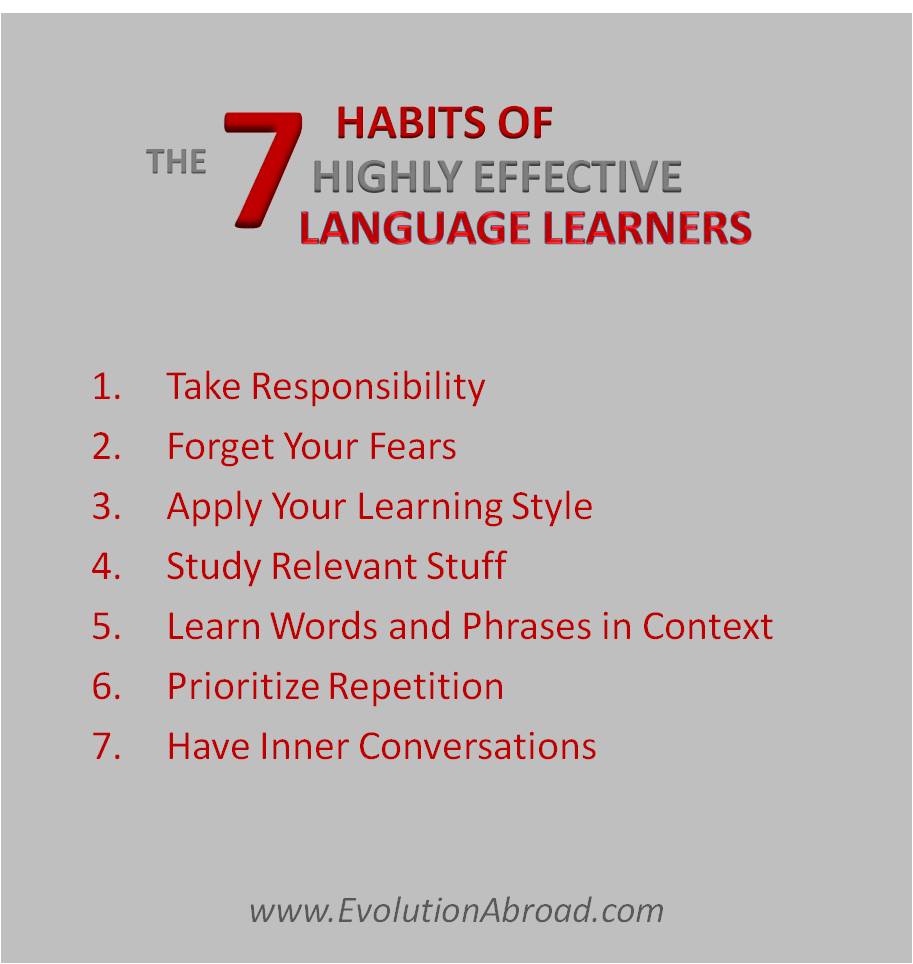The biggest misconception about foreign language learning is that immersion will cause you to learn the language. The problem of immersion is it´s passive character: Simply being among native speakers doesn´t guarantee fluent language skills. It requires an active attitude.
Learning a foreign language
won´t miraculously happen
it´s a skill you have to work for
So what does make a language learner an effective acquirer of a foreign language?
Try the 7 habits:
Habit #1 – Take Responsibility
Learning a new language is a continuous learning process that requires a long term commitment. Effective language learners make time for it, work hard, have patience and persevere also without having a teacher acting pressure on them. They take responsibility for their progress and create opportunities to practice the language as much as possible.
They monitor their own speech as well as the speech of others, they are initiators of conversation and ask conversation partners to correct their errors. Effective language learners take the initiative to get it right from the start. Requiring the new language skill is within their control.
Habit #2 – Forget Your Fears
Effective language learners realize that fear for making mistakes has the wrong outcome: Due to insecure feelings you won´t be speaking as much as you should. As a result, you only have little practice and it will be hard to reach a fluent level soon. You are basically sabotaging your own progress.
There is no other way to become fluent in a foreign language than passing this hurdle of shame. Effective language learners take the risk and don´t let self-consciousness be an obstacle. It´s normal to feel like a small child not being able to talk and discuss about anything you would like. Acceptance of the awkwardness is a must.
Solely in the world of languages is the amateur of value
Well-intentioned sentences full of mistakes can still build bridges between people
Kató Lomb, Polyglot by heart
Habit #3 – Apply Your Learning Style
Do you remember words more easily by listening or reading? Do you prefer group or private classes? Some people are visual learners and prefer to read a text to learn. Oral learners learn best by hearing new words and sentence structures. I am defenitely a visual learner. I need to write down the words and read it.
Knowing your preferable learning style also involves being aware of your attention span. It´s not effective to study when you aren´t fully concentrated anymore. Know your limits and apply the learning strategy that suits you best to make the most of every learning moment.
Habit #4 – Study Relevant Stuff
The biggest waste of time for a language learner is studying every single word or idiom he or she comes across. Even in your native language your vocabulary score isn´t 100%; so why getting obsessed with studying so much in a foreign language? Effective language learners focus on important vocabulary and phrases; the ones that show up again and again.
I love reading and my personal learning style is visual, so I always thought reading books in the target language was the best way to improve my language skills. However, as a beginner you aren´t able to distinguish the relevant from the irrelevant yet, so I ended up wasting my time looking up useless stuff. I didn´t even bother memorizing it.
Rather focus on expressions regarding your work, hobbies or other interests. The topics you´ll be talking about the most show you what´s relevant to study.
Habit #5 – Learn Words and Phrases in Context
Every language has words with various meanings based on their contexts (e.g. period has the meaning of an amount of time and a fullstop), words that can be a verb and a noun (e.g. a break and to break), and words with literal and figurative meanings (e.g. a ball and to be on the ball). In linguistics this phenomenon is called polysemy. It´s the reason why effective learners don´t memorize words and expressions isolated but always in context.
Both printed and online dictionaries usually provide example sentences that illustrate words in different contexts. Read all of them to get a feeling for the word and it´s several meanings. You don´t memorize every meaning, but developing a sense of meaning is useful. Effective language learners eventually memorize the meanings they encounter most frequently.
Habit #6 – Prioritize Repetition
As we know created memories are firstly stored in short-term memory and some of them ultimately in long-term memory. Repetition is required to reach the final stage. Not before newly acquired words and grammatical structures are settled in your long-term memory you can start using it. Repetition is therefore essential for great language skills.
Repeat relevant stuff in context and your language skill will grow consciously.
Habit #7 – Have Inner Conversations
There is a continuous conversation going on in everyone’s head. An effective language learner is aware of the language he or she is using for it. It´s the perfect way to improve your language skill when alone and to maintain the languages you don´t speak frequently.
Be aware of your thoughts and control them. It´s the start of every fluent conversation and before you know it, this activity goes automatically. Dreaming in the foreign language is the final result of thinking in the foreign language; a sign that you´re really getting a hang of it!
Putting Quality above Quantity
This is my personal approach of learning languages and I can confirm that developing the 7 habits enabled me to become fluent in three foreign languages fairly rapidly.
One last advice I´d like to give is neglecting promises of getting fluent in 3 months or less! Such promises only put pressure on your learning process and “fluent” seems to be rather subjective in this context. If you want to be able to establish friendships abroad and have sufficient language skills for a job, it takes longer than only a couple of months to become “fluent”.
Applying the 7 habits will support you in being yourself in a foreign language which is the basis of feeling at home in a new host country: The expat´s ultimate goal!
Good luck! 
What habits have you adopted in your language learning process?


